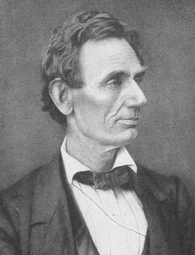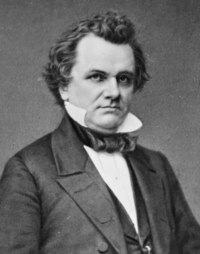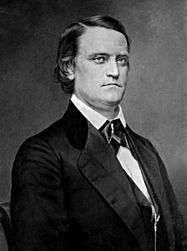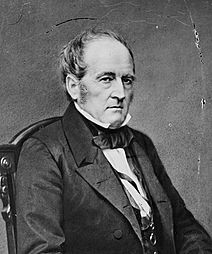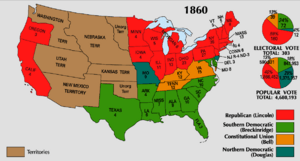United States presidential election, 1860 facts for kids
The United States presidential election of 1860 happened on Tuesday, November 6, 1860. This election was a major event that led to the start of the American Civil War.
During the 1850s, the United States was deeply divided. The main issue was whether slavery should be allowed to spread into new areas. People also argued about the rights of slave owners. By 1860, these disagreements caused the Democratic Party to split into three different groups. Each group believed their candidate could win against the Republican Party candidate.
Contents
Democrats Split Apart
In April 1860, the Democrats met in Charleston, South Carolina. They wanted to choose their candidate for president. But the meeting was very chaotic.
Democrats from the North wanted to choose Stephen A. Douglas. However, Southern Democrats would not support him. This was because Douglas believed new states should decide for themselves if they would allow slavery.
The convention could not agree on a candidate. Later, the Northern Democrats met again and chose Douglas. The Southern Democrats chose John C. Breckinridge. He was the Vice President of the United States at the time.
A third group also formed. This was the new Constitutional Union Party. They chose John Bell as their candidate. This party included some Southern Democrats who were against slavery. It also had members from other older parties. The Constitutional Union Party was against states leaving the country. They tried to stay neutral on the issue of slavery.
Republicans Choose Lincoln
The Republican Party saw a chance to win because the Democrats were split. They held their meeting in Chicago from May 16 to 18. Many people thought William H. Seward would be the Republican candidate.
However, Abraham Lincoln had become well-known. This was thanks to his debates with Stephen A. Douglas in 1858. Lincoln also had an advantage because the convention was in Chicago. This city was a center of his support. After two votes, no one had a clear lead. On the third vote, the Republicans chose Lincoln as their candidate.
Lincoln's Campaign Message
Lincoln's views on slavery were well-known. He had shared them during his debates with Stephen Douglas in 1858. In one debate, he said, "I believe this government cannot endure permanently half slave and half free." He also famously stated, "A house divided against itself cannot stand."
Even with these strong words, Lincoln was seen as a moderate on slavery. He knew he could not end slavery in the Southern states right away. Instead, he only spoke out against slavery spreading into new American territories.
Election Results and What Happened Next
Lincoln won the election with 1,866,452 votes. Douglas received 1,376,957 votes. John Breckinridge and John Bell shared the remaining votes. Lincoln won the most electoral college votes. This made him the president.
However, Lincoln won without getting a single vote from any Southern state. Before Lincoln became president, seven Southern states announced they were leaving the United States. They called this secession.
In his inaugural address, Lincoln spoke to the Southern states. He said, "In your hands, my dissatisfied fellow countrymen, and not in mine, is the momentous issue of civil war." He also told them, "The government will not attack you." He said they would only have conflict if they started it. Lincoln called them friends and said they were not enemies.
Unfortunately, by this time, Jefferson Davis was already the president of the Confederacy. This was the new group of Southern states. Later, Virginia, North Carolina, Arkansas, and Tennessee joined them. Two states, Kentucky and Missouri, tried to stay neutral.
On April 12, 1861, the first shots of the Civil War were fired. This happened at Fort Sumter, South Carolina.
Images for kids
-
The South Carolina Institute in Charleston. This building hosted the Democratic National Convention in 1860.
-
The Chicago Wigwam, where the Republican Convention was held.
-
Governor Sam Houston of Texas.
-
Former Senator Edward Everett from Massachusetts.
-
Former Senator William A. Graham from North Carolina.
-
Former Senator William C. Rives from Virginia.
-
Former Representative Gerrit Smith from New York.
-
Governor Sam Houston of Texas.
See also
 In Spanish: Elecciones presidenciales de Estados Unidos de 1860 para niños
In Spanish: Elecciones presidenciales de Estados Unidos de 1860 para niños
 | Charles R. Drew |
 | Benjamin Banneker |
 | Jane C. Wright |
 | Roger Arliner Young |


